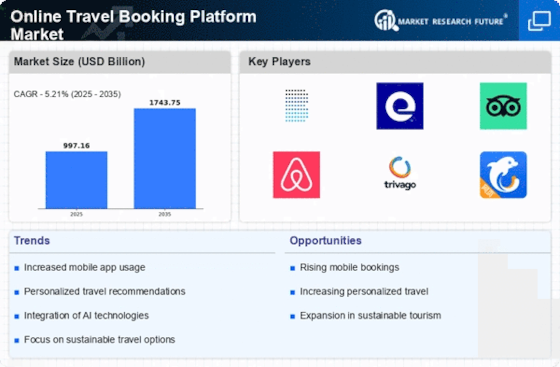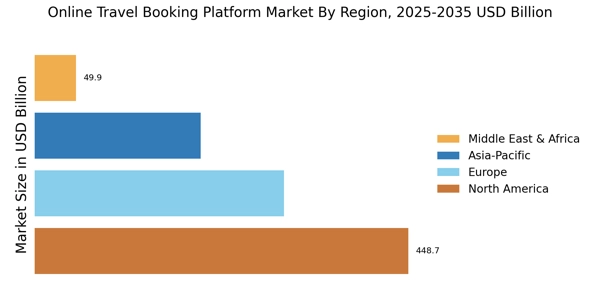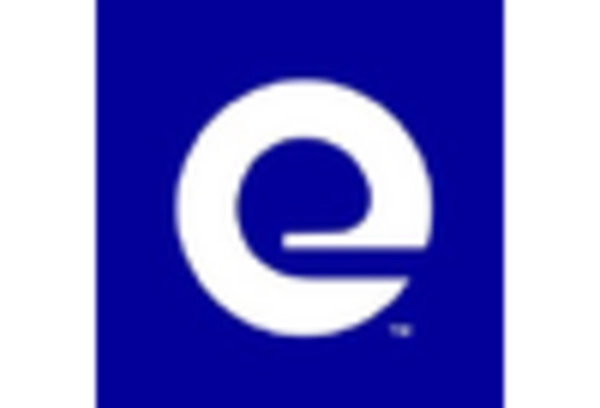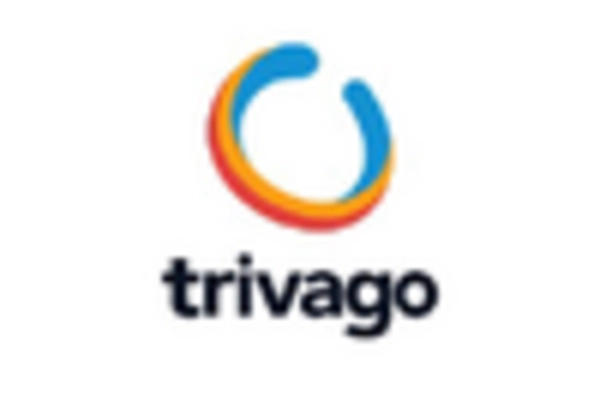Mobile Device Adoption
The proliferation of smartphones and mobile devices is transforming the Online Travel Booking Platform Market. With mobile device ownership surpassing 80% in various demographics, consumers are increasingly utilizing mobile applications for travel bookings. This shift towards mobile platforms is indicative of changing consumer behavior, where convenience and immediacy are paramount. The ability to book travel on-the-go has led to a surge in mobile bookings, which now account for a substantial portion of total online travel bookings. As mobile technology continues to evolve, the Online Travel Booking Platform Market is likely to see further growth driven by mobile-first strategies and enhanced user experiences.
Rising Internet Penetration
The increasing accessibility of the internet is a pivotal driver for the Online Travel Booking Platform Market. As more individuals gain access to reliable internet services, the number of potential users for online travel booking platforms expands significantly. According to recent data, internet penetration rates have reached approximately 60% in many regions, facilitating a shift from traditional booking methods to online platforms. This trend is likely to continue, as advancements in technology and infrastructure further enhance connectivity. Consequently, the Online Travel Booking Platform Market is poised to benefit from a growing user base, as consumers increasingly prefer the convenience and efficiency of online booking options over conventional methods.
Evolving Consumer Preferences
Consumer preferences are rapidly evolving, significantly impacting the Online Travel Booking Platform Market. Today's travelers seek personalized experiences, convenience, and flexibility in their travel arrangements. This shift is reflected in the increasing demand for platforms that offer tailored recommendations and seamless booking processes. Data indicates that nearly 70% of travelers prefer platforms that provide customized options based on their preferences and past behaviors. As a result, online travel booking platforms are adapting to meet these expectations, enhancing their offerings to include personalized itineraries and user-friendly interfaces. This evolution in consumer preferences is likely to drive further innovation within the Online Travel Booking Platform Market.
Competitive Pricing Strategies
The Online Travel Booking Platform Market is characterized by intense competition, prompting platforms to adopt aggressive pricing strategies. With numerous players vying for market share, consumers benefit from a wide array of options and competitive pricing. Recent analyses suggest that price comparison features are among the most sought-after functionalities by users, as they enable travelers to find the best deals available. This competitive landscape encourages platforms to innovate continuously, offering discounts, loyalty programs, and exclusive deals to attract and retain customers. As competition intensifies, the Online Travel Booking Platform Market is likely to experience sustained growth driven by these pricing dynamics.
Integration of Advanced Technologies
The integration of advanced technologies is reshaping the Online Travel Booking Platform Market. Innovations such as artificial intelligence, machine learning, and big data analytics are enhancing the functionality and user experience of online travel platforms. These technologies enable platforms to analyze consumer behavior, optimize pricing, and provide personalized recommendations. For instance, AI-driven chatbots are increasingly used to assist customers in real-time, improving service efficiency. As these technologies become more prevalent, they are expected to drive user engagement and satisfaction, ultimately contributing to the growth of the Online Travel Booking Platform Market. The ongoing technological advancements suggest a promising future for this sector.

















